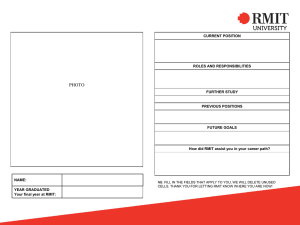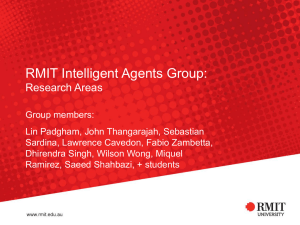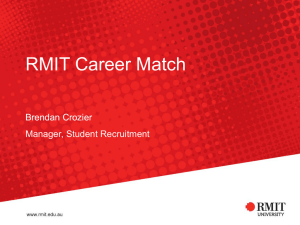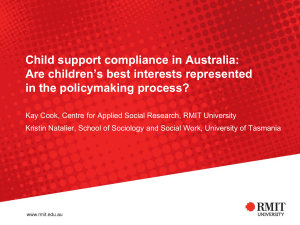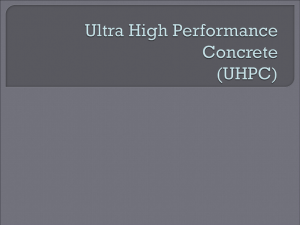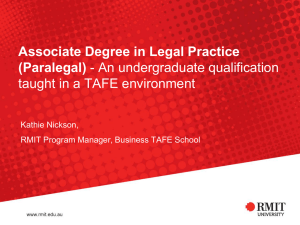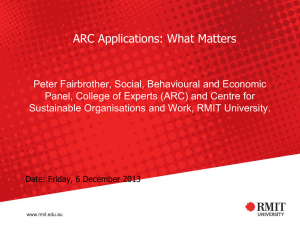The Master of Professional Accounting (MPA)
advertisement
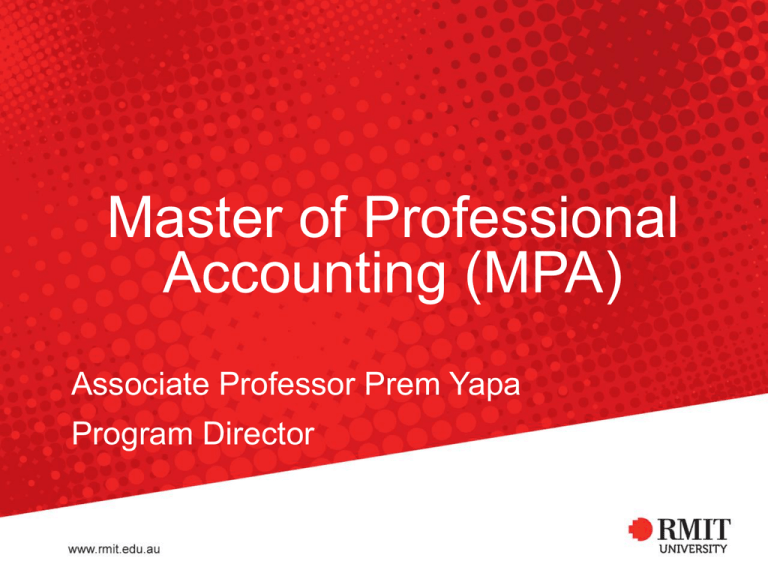
Master of Professional Accounting (MPA) Associate Professor Prem Yapa Program Director RMIT College of Business • One of the largest business colleges in Australia • Consists of Six Schools – Accounting – Level 15 – Economics, Finance & Marketing – Level 12 – Business Information Technology – Level 17 – Graduate School of Business and Law – Building 113 – Management – Level 16 – Business TAFE – Level 13 School of Accounting • U/G and P/G Accounting programs, Research degrees • Providing education across S.E. Asia • Reputation for practice-based programs • Strong links with industry The Master of Professional Accounting (MPA) The Master of Professional Accounting (MPA) program at RMIT offers with practical and theoretical knowledge, skills and expertise to enable students to become literate and analytical practitioners in accounting. – It is designed for graduates of nonaccounting disciplines who wish to broaden their career prospects, permitting entry into the accounting profession. The Master of Professional Accounting (MPA) – Industry relevant projects, solving problems for real clients and exposure to realistic business problems and environments are essential features of the MPA degree. – Course content is consistently redefined to meet the emerging demands of business and the broader community which means that our MPA program will be wholly relevant to the national and global market place. Who can follow RMIT - MPA – Australian and international students (both with and without work experience) who have a generalist undergraduate degree and seek to pursue a career in the accounting profession. – International students who seek entry to CPA Australia and Institute of Chartered Accountants in Australia and Institute of Public Accountants. – These may include students who have undertaken an accounting major in undergraduate degrees not deemed equivalent to an Australian undergraduate degree. Who can follow RMIT - MPA – Australian students seeking a career change who have vocational work experience. This includes various careers, for example, nursing, teaching, marketing engineering, forensic science, business administration, information technology and scientific researchers who are currently enrolled in the program – Countries represented by international students currently include the following: China (majority), India, Russia, Nepal, Indonesia, Vietnam, Norway, Thailand, United Kingdom, Japan, South Korea, Hong Kong, Malaysia and Singapore. The Master of Professional Accounting (MPA) • Accredited by CPA Australia, ICAA & IPA • Consists of 12 courses in: – Financial accounting (including accounting theory) – Management accounting – Law (commercial/corporate, tax) – Auditing – Economics – Finance – Information Systems The Master of Professional Accounting (MPA) 6 Core Courses + 6 Electives Course Code Course Name Pre-requisite CPA CA Enrolled Semester 6 Core Courses (Master) ACCT1106 Introduction to Financial Accounting NIL 1.1 LAW2480 Business and Corporations Law NIL 1.2 BAFI1100 Financial Decision Making NIL 1.1 ACCT1109 Management and Cost Accounting ACCT1106 2.1 ACCT1110 Accounting for Corporations ACCT1106 2.1 ACCT2111 Contemporary Accounting Thought ACCT1110 Compulsory for Master students 3.2 6 Electives – For CPA / CA *ECON1113 Economic Analysis for Business *LAW2471 Taxation Law and Practice *ECON1232 Quantitative Methods for Accounting *ACCT1111 Auditing and Assurance Services ACCT1110 *ISY2391 Strategic Info Systems & Accounting ACCT1106 XXXXXX Other Elective(s) -any PG courses with 12 credit point Note: NIL LAW2480 NIL 1.2 2.2 2.2 * are highly recommended that these courses are taken to strengthen career opportunities. 3.1 3.1 3.2 The Master of Professional Accounting (MPA) • Core technical knowledge • Capabilities and skills – Cognitive – writing (reports) – analytic (problem solve, reason) – appreciative (ethics, interdisciplinary) – Behavioural – personal (creative, independent) – interpersonal (listening, presentation) Resources • There are a range of University resources: • RMIT Business Library Level 5, Building 108 http://www.rmit.edu.au/library • Study and Learning Centre Level 4, Building 108 www.rmit.edu.au/studyandlearningcentre • http://www.rmit.edu.au/students Resources • Student Computer Lab – (Level 3) • Student Hub – Level 3 –Student cards; Change of address; Pick up forms; Copies of Confirmation of Enrolment; Fees; Official results printouts, Apply Letter of Completion etc. • RMIT International – Building 22 main campus –Visa issues; Change of citizenship; Medicare; Change of program; Working permit etc. • Business Library – Level 5 Location? • School of Accounting – Level 15 – Leave of absence requests; Program enquiries and academic advice; Student progress issues; Exemptions; Extension of visa; prerequisites; Change of courses etc. • Most classes in this building (108) and building (13). International Student Service Centre • Promotion of RMIT to prospective students • Pre-arrival information • Arrival & Reception Services for commencing students • Visa information & advice • OSHC information & advice • Applications for Admission • Central liaison with DIAC – DEST • Refunds before enrolment • Advice on program transfers/ cancellations etc • Visa Renewals Change of address Students must notify RMIT University of any change in personal details. • New Students – within 7 days of arrival • Continuing students – within 7 days of the change occurring • Use enrolment on-line. Where to Obtain Course/Program Advice • Program Director MPA Assoc Professor Prem Yapa prem.yapa@rmit.edu.au - 9925 1606 • Deputy Program Director MPA Dr Mahesh Joshi Mahesh.joshi@rmit.edu.au – 9925 1453 • Contact our Postgraduate Program Administrative Officer Benbie Lau – benbie.lau@rmit.edu.au - 9925 5768 Nicky Palagyi – nicolette.palagyi@rmit.edu.au - 9925 5717 RMIT Experience • Social as well as academic experience • The opportunity to receive a quality education
